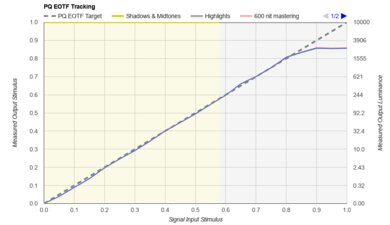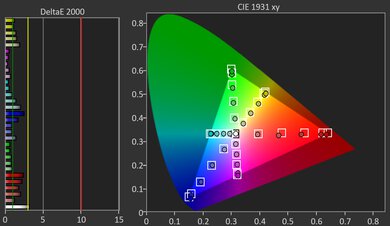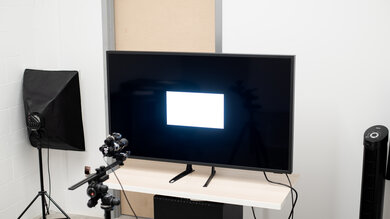- Table of Contents
- Intro
- Best TV
- Best Outdoor
- Best Mid-Range
- Best Budget
- Best Cheap
- Notable Mentions
- Recent Updates
- All Reviews
- Comments

The best way to watch most content is to turn the lights off. However, this isn't very practical during the day when watching sports with the curtains open or if you simply like to leave the lights on while watching your favorite shows. You don't want to see distracting reflections on your screen, so if you plan on placing your TV in a bright room, there are certain criteria you should consider before purchasing.
The most important aspects a TV needs to fight glare in a bright room are SDR peak brightness and HDR peak brightness. During our rigorous testing process, we see how bright a TV can get. Generally speaking, the brighter the TV, the better it overcomes glare. However, reflection handling is also a very important factor to consider. Even if a certain TV can get very bright, you may still see reflections caused by indirect and direct light sources if it has poor reflection handling. This becomes especially important if you're in a smaller space with a lamp positioned in front of the screen. The lamp's reflection will be distracting if your TV doesn't do a good job of reducing the intensity of the light.
Even if a TV is very bright and has good reflection handling, you still want it to provide solid overall picture quality, so our recommendations below also consider that. You can also see our picks for the best TVs for watching movies, the best TVs for watching sports, and the best outdoor TVs. Additionally, you can vote on which ones you want us to buy and test. To learn more about the 2024 models, check out our 2024 TV lineup page.
-
Best TV For Bright Rooms
Mixed Usage8.4Home Theater8.6Bright Room8.5Sports8.5Gaming7.7Performance Usages: Brightness9.0Black Level8.7Color8.5Processing (In Development)8.7Game Mode Responsiveness6.5Motion Handling (Broken)7.8Resolution 4kNative Refresh Rate120HzScreen FinishGlossyType LEDSub-TypeVADolby VisionYesSizes 65" 75" 85"The Sony BRAVIA 9 QLED is the best TV for bright rooms we've tested. Its superb reflection handling and SDR brightness means it easily overcomes glare in the brightest of rooms, so you aren't distracted by reflections on your TV screen. As impressive as this TV is in a bright room, it also looks spectacular in a dark room. It has exceptional black levels with almost no blooming, thanks to its highly effective local dimming control. It's also a great option for 4k Blu-ray collectors or those looking to get the most out of high-quality streaming services due to its support for Dolby Vision and DTS audio formats.
The TV's image processing is excellent for upscaling and smoothing out low-quality content. It's also very accurate in both SDR and HDR, so it delivers an image that respects the content creator's intent. Unfortunately, its viewing angle is mediocre. It's not the best option if you regularly watch shows or movies with a big group of friends since the image degrades when viewed from the sides of the screen. However, it's a great option if you need a TV that pairs well with modern consoles. It has HDMI 2.1 bandwidth on two ports for up to 4k @ 120Hz with VRR, so it's fully compatible with the PS5 and Xbox Series X|S. Additionally, it has a quick response time for clear motion and low input lag for a responsive gaming experience.
-
Best Bright TV For The Outdoors
Mixed Usage8.1TV Shows7.8Sports7.9Video Games8.3HDR Movies8.1HDR Gaming8.3PC Monitor8.3Resolution 4kNative Refresh Rate120 HzScreen FinishGlossyType LEDSub-TypeVADolby VisionNoSizes 55" 65" 75"Although most of these picks focus on TVs for bright indoor rooms, what if you want to watch TV outside? Enter the Samsung The Terrace, the best outdoor TV we've tested. Even if you want to use your TV in an enclosure outside, it's easy for light to get through, so you'll want something that gets bright enough and minimizes reflections well. Samsung designed this TV explicitly for outdoor use, so it's made to handle direct sunlight, making it one of the brightest TVs we've tested. Plus, it has an IP55 rating for water protection, so you won't have to worry too much if it rains. The reflection handling is fantastic, meaning it looks amazing in any outdoor setup.
It's also a great gaming TV, with HDMI 2.1 bandwidth on one port and low input lag. However, it doesn't support any variable refresh rate (VRR) technologies. Unfortunately, it has only one HDMI 2.1 port, so you can't connect multiple recent consoles to the TV, but it's a great TV to hook up your Nintendo Switch to at your BBQ parties. Thanks to the built-in Tizen smart platform, you won't have to get an extra box to stream your favorite content, and the built-in speakers are decent enough to use without a soundbar. It's also a lot more expensive than the better overall Sony BRAVIA 9 QLED, so the Sony is the better choice unless you plan on using it outdoors.
-
Best Mid-Range TV For Bright Rooms
Mixed Usage8.3Home Theater8.4Bright Room8.5Sports8.2Gaming8.2Performance Usages: Brightness9.2Black Level8.9Color8.0Processing (In Development)7.2Game Mode Responsiveness7.8Motion Handling (Broken)7.6Resolution 4kNative Refresh Rate144HzScreen FinishGlossyType LEDSub-TypeVA (except 75")Dolby VisionYesSizes 55" 65" 75" 85" 100"The best mid-range TV for bright rooms we've tested is the Hisense U8/U8N. It's a great TV for watching shows or sports during the day. Like the Sony BRAVIA 9 QLED, it uses Mini LED technology to get exceptionally bright and overcome glare. It edges out the Sony and the Samsung The Terrace when it comes to reflection handling, so it's the best anti-glare TV on this list. The TV has surprisingly good image processing capabilities, so movies and shows look good no matter their source, even if it isn't quite as good as the Sony TV. Due its very effective local dimming, the TV displays very deep blacks with only slightly more blooming than the Sony, so it also looks great in a dark room.
The TV's viewing angle is even narrower than that of the Sony, so it's not as good overall if you have a wide seating arrangement, as the image isn't consistent when viewed from the sides. Still, it's an excellent TV for gaming thanks to its low input lag and fast response time. The TV has great gaming features, including HDMI 2.1 bandwidth on all four HDMI ports for up to 4k @ 144Hz gaming, so it's fully compatible with recent consoles.
-
Best Budget TV For Bright Rooms
Mixed Usage7.6TV Shows7.0Sports7.3Video Games8.2HDR Movies7.6HDR Gaming8.1PC Monitor8.0Resolution 4kNative Refresh Rate60 HzScreen FinishSemi-glossType LEDSub-TypeVADolby VisionYesSizes 55" 65" 75" 85"The best TV for bright room viewing in the budget category we've tested is the Hisense U6/U6N. It's a good TV for a bright room, with very good SDR peak brightness and decent reflection handling, so it overcomes glare in a moderately lit room. Its semi-gloss coating reduces the intensity of ambient light well, but it doesn't deal as well with reflections from lights directly opposite the TV, so it's not as good as the Hisense U8/U8N for a room with many windows. If you also turn the lights off to watch movies or shows, the TV's local dimming delivers deep blacks that are quite impressive for a TV in this price range. It's even bright enough in HDR to make some highlights pop out against darker backgrounds.
Of course, you lose something by going with a cheaper model, and in this case, the TV doesn't get as bright as the more expensive models above, has worse contrast, doesn't remove artifacts very well from low-quality content, and is limited to 4k @ 60Hz. However, you can choose to drop your resolution to play games up to 1440p @ 120Hz, which is a great feature for a budget model. Additionally, it has fantastic low input lag, a good response time, and VRR support, so it's a good budget gaming TV.
-
Best Cheap TV For Bright Rooms
Mixed Usage7.3TV Shows7.0Sports7.1Video Games7.6HDR Movies7.2HDR Gaming7.8PC Monitor7.7Resolution 4kNative Refresh Rate60 HzScreen FinishSemi-glossType LEDSub-TypeVADolby VisionYesSizes 43" 50" 55" 65" 75" 85"The Hisense A7N is the best cheap television overall for bright rooms. It's not the brightest TV, but it does have very good reflection handling, meaning it fights glare in rooms with the lights on. It delivers decent overall picture quality, with good black uniformity, but lacks advanced features like local dimming. HDR content looks acceptable, with visually appealing saturated colors, but it's not quite bright enough to make most highlights stand out.
It's still a cheap TV, though, and its low-quality content smoothing is quite bad. Fortunately, it has the same good upscaling capabilities as the more expensive Hisense models, and it still supports HDR10+, Dolby Vision, and DTS audio formats, which is great for a TV this affordable. This cheap TV offers gamers a few features: a good response time, extremely low input lag, and VRR support. However, you are limited to a 60Hz refresh rate across all resolutions.
Notable Mentions
- LG G4 OLED: The LG G4 OLED is an OLED that's bright enough in HDR and SDR to be considered a good bright room TV. While it can't sustain its peak brightness nearly as well as the Sony BRAVIA 9 QLED or Hisense U8/U8N, it's still easily bright enough for a well-lit room. Consider it if you're itching to get an OLED but are hesitating due to bright room performance. See our review
- TCL QM8/QM851G QLED: The TCL QM8/QM851G QLED is a great TV and one of the brightest we've tested. It's a great alternative to the Hisense U8/U8N; however, it has worse reflection handling and worse contrast than most sizes of the Hisense, so the Hisense is the better option for most people. See our review
- Samsung QN90D/QN90DD QLED: The Samsung QN90D/QN90DD QLED is a great TV and a competitor to the Sony BRAVIA 9 QLED. It has HDMI 2.1 bandwidth on all four ports and has lower input lag than the Sony, but the Sony has it beat in most other ways. The Sony displays blacks that are approaching OLED territory, is more accurate, and has better image processing. See our review
- Roku Select Series:
The Roku Select Series is a good alternative to the Hisense A7N. The Roku gets brighter than the Hisense in SDR, but the Hisense has better reflection handling, so they perform very similarly in bright rooms. However, the Hisense gets brighter in HDR, displays a much wider range of colors, and has better upscaling capabilities, making it the better TV for most people.
See our review - Samsung S95D OLED:
The Samsung S95D OLED is the only OLED on the market that uses a matte screen coating. The screen coating does an amazing job of eliminating reflections caused by glare, but it does so at the cost of picture quality in a bright room, making it lose the impact an OLED typically has. Unless you also regularly use your TV in a dark room, where the impact of an OLED is really seen, you're better off getting a TV like the Sony BRAVIA 9 QLED or the Hisense U8/U8N.
See our review
Recent Updates
-
We added the Samsung S95D OLED to the Notable Mentions and reviewed the text for accuracy.
-
Sep 27, 2024 : Replaced the Hisense U8/U8K with the Hisense U8/U8N in the 'Best Mid-Range TV For Bright Rooms' category and replaced the Hisense U6/U6K with the Hisense U6/U6N in the 'Best Budget TV For Bright Rooms' category. We also updated the Notable Mentions section.
-
Jul 05, 2024 : We swapped the Sony X93L/X93CL with the Sony BRAVIA 9 QLED in the 'Best TV For Bright Rooms' category. We also refreshed some text throughout the article for clarity.
-
May 09, 2024 : Added mentions of the Hisense U6N and the Hisense U8N in the 'Best Budget TV For Bright Rooms' and the 'Best Mid-Range TV For Bright Rooms' categories.
-
Mar 12, 2024 : Ensured the availability and accuracy of our current picks.
All Reviews
Our recommendations above are what we think are currently the best TVs for bright rooms for most people in each price range. We factor in the price (a cheaper TV wins over a pricier one if the difference isn't worth it), feedback from our visitors, and availability (no TVs that are difficult to find or almost out of stock everywhere).
If you would like to do the work of choosing yourself, here is the list of all our reviews of TVs. Be careful not to get too caught up in the details. While no TV is perfect, most TVs are great enough to please almost everyone, and the differences are often not noticeable unless you really look for them.
Comments
Best TV For Bright Room Viewing: Main Discussion
What do you think of our picks? Let us know below.
Looking for a personalized buying recommendation from the RTINGS.com experts? Insiders have direct access to buying advice on our insider forum.
We’ve just released a new video that mentions the Hisense U8/U8N here.
















![Hisense A7N [A7, A75N] Design Picture](https://i.rtings.com/assets/products/j0TFYuw6/hisense-a7n-a7-a75n/design-small.jpg?format=auto)
![Hisense A7N [A7, A75N] In-Test Picture](https://i.rtings.com/assets/products/c0cUksGO/hisense-a7n-a7-a75n/in-test-small.jpg?format=auto)
![Hisense A7N [A7, A75N] PQ EOTF Graph](https://i.rtings.com/assets/products/k0Qprpu7/hisense-a7n-a7-a75n/pqeotf-graph-small.jpg?format=auto)
![Hisense A7N [A7, A75N] Pre Color Picture](https://i.rtings.com/assets/products/KSSNboQk/hisense-a7n-a7-a75n/pre-colorspace-small.jpg?format=auto)














































